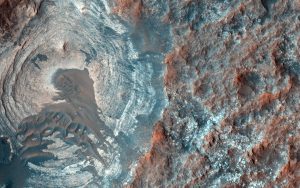
From the June 2020 Desktop News | For Dr. Alain Plattner, a research lab isn’t just a place to make groundbreaking discoveries or work on a singular idea. To him, it’s the perfect place to cultivate a new generation of scientists—a place where his students can explore their own ideas and build off of one another, strengthening their skills as researchers and planetary scientists. His goal is to build a strong planetary science research group, where students from the southeast can learn about our solar system without having to travel more than a couple hours from home.
“My goal is to provide my students with the training they need to fulfill their career goals,” Plattner said. “If they want to be NASA scientists, I want to give them everything they need to do that. If they are studying planetary science because they want to learn something interesting, but want to go into a different field, I’m also trying to get them anything and everything they need to do that successfully.”
Plattner, an assistant professor in UA’s department of geological sciences, was recently awarded a NASA Planetary Science Early Career Award. Plattner is one of only six researchers receiving this award, which is given to exemplary planetary scientists who have finished their Ph.D. within the past decade and have already been awarded another NASA grant.
While this distinction is important for Plattner, he made it clear that the money accompanying the award would fund the work of Alyssa Mills, a master’s student at UA, who is studying the magnetic field of Ganymede, one of Jupiter’s moons.
“The research that’s being funded is Alyssa Mill’s idea, and that’s how I presented it in the application,” Plattner said. “I said, ‘If you fund me, this money will go directly to the next generation of really talented planetary scientists to pursue their own research ideas.’”
Since his arrival at UA in 2018, Plattner has been recruiting bright minds from the Alabama/Mississippi area, the United States, and the world to participate in various research projects. His research looks at the magnetic fields of different planets and moons, studying the internal structure and geologic history of these planets and moons.
Currently, Plattner has projects looking at the magnetic fields of Mercury, Ganymede, and Mars. He hopes that this research, as well as research regarding other planets and moons, will draw student researchers from multiple disciplines to UA.
“Planetary science is such a team sport,” Plattner said. “No single lab or discipline alone can really unlock all of the secrets of those planets and moons. So we need to work together with people who study other fields, such as chemistry, physics, or the gravitational pull of these planets and moons. Ultimately, my hope is to be part of that group, and train the next generation of people who contribute to understanding these objects.”